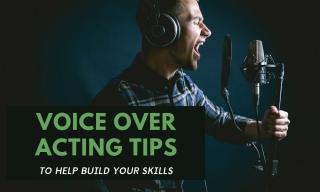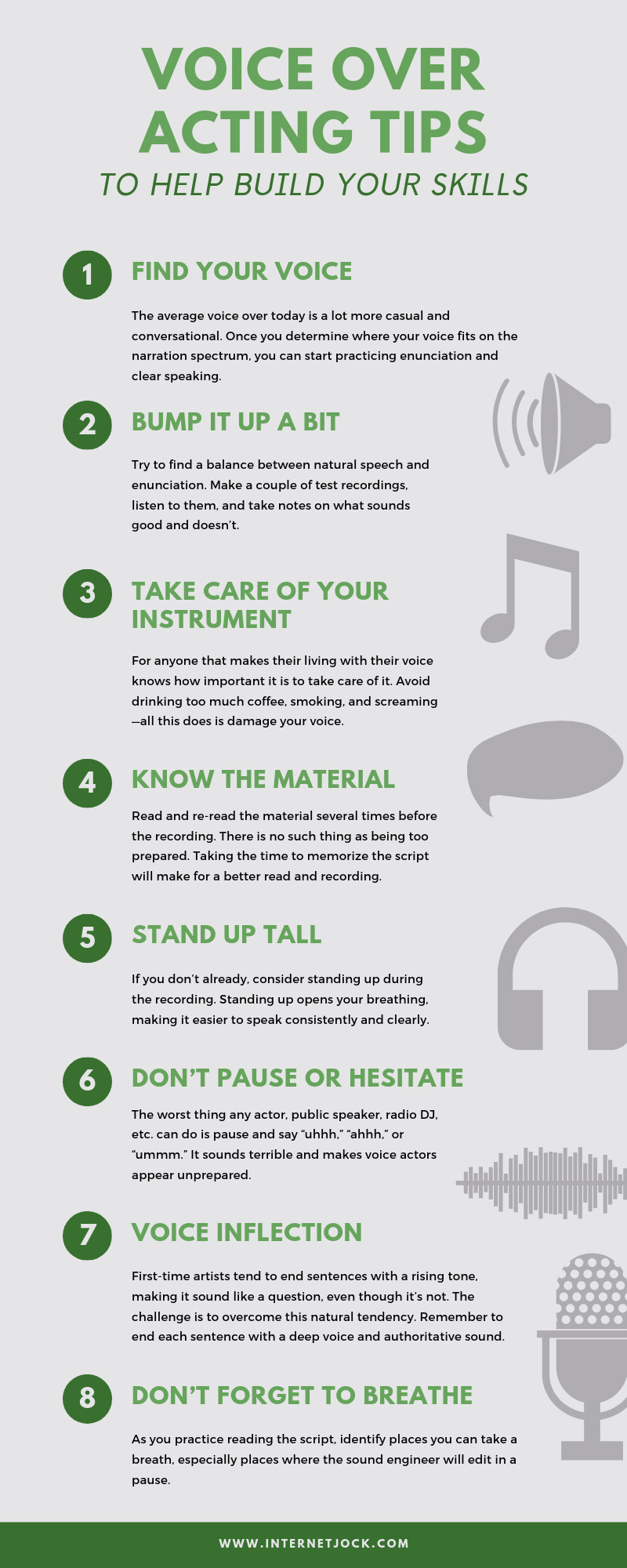
Voice Over Acting Tips to Help Build Your Skills
Doing voice over work is more than just making funny voices or talking into a microphone. It is a talent and skill that you must continually develop and train. If you want to have a long, successful career as a voice over actor, you must make sure that your voice is in excellent condition. To garner attention from voice over companies and casting directors, a confident, polished script reading is the key. There is an old maxim “it’s not what you said, it’s how you said it”—nothing could be truer in the world of voice over actors. Take the time to find and build your voice. Rather than spending thousands of dollars on voice training and coaching, check out our voice over acting tips and start sharing your talent with the world.
Find Your Voice
We all know the deep voice that perfectly enunciates every movie trailer or introduces the talent at a show you’re attending. However, as of late, this voice has not been in high demand. The average voice over today is a lot more casual and conversational. This trend is good for the first-time voice over actor since they don’t have to supercharge their voice to meet certain criteria. There is a sizable gap between a typical, casual narrator and the well-known deep voice telling you about the latest movie release. Once you determine where your voice fits on the narration spectrum, you can start practicing enunciation and clear speaking.
Bump It Up a Bit
Your normal speaking voice is great for daily interactions. In a voice over, however, this completely natural tone may not be the right fit. To compensate for this, you need to bump your voice up a bit. Try to find a balance between natural speech and enunciation. Make a couple of test recordings, listen to them, and take notes on what sounds good and doesn’t. What you find will be easy to correct with practice. Try to add some emotion and inflection in your voice as well. It might seem funny or over the top, but odds are it will be just right.
Take Care of Your Instrument
Singers, actors, and voice over actors should consider their voice an instrument and treat it as such. For anyone that makes their living with their voice knows how important it is to take care of it. Avoid drinking too much coffee, smoking, and screaming—all this does is damage your voice. It’s similar to leaving instrument, such as a guitar, out of its case to get knocked around and then being surprised when it doesn’t sound good. To ensure your voice is in pristine condition, avoid doing anything that will dry out your throat and mouth before a recording. Get a good night’s sleep and drink a few liters of water throughout the day. Further, perform some warm-ups before you start recording. After all, you wouldn’t run a marathon without stretching your legs first.
Know the Material
If this tip isn’t obvious, it should be. Read and re-read the material several times before the recording. Sure, skimming a thirty-second spot script is easy; however, what if you have a thirty-minute training video loaded with technical terms? There is no such thing as being too prepared. Taking the time to memorize the script will make for a better read and recording. Knowing how things in the script fit together will help with pacing as well. Don’t be afraid to add some excitement and emotion in your read when appropriate. The script will sound different in your head, so make sure you read it out loud at some point. This will help you identify any words you may stumble on and correct it.
Stand Up Tall
If you don’t already, consider standing up during the recording. Standing up opens your breathing, making it easier to speak consistently and clearly. Sitting compresses your breathing muscles and makes it more difficult to receive enough air. By eliminating the compression of the muscles, you’ll be able to take deep breaths with no problem. Plus, more air means not having to interrupt your read as often, so the delivery will likely be smoother. Reading from a standing position will allow you to be more animated, which is also a good thing. Get your whole body into the read—pretend you’re speaking to a person. Gesture, wave your arms, and nod your head as you would in front of an audience. These motions will transfer to the recording and make for better performance.
Don’t Pause or Hesitate
The biggest obstacle for any voice over actor is stumbling. The worst thing any actor, public speaker, radio DJ, etc. can do is pause and say “uhhh,” “ahhh,” or “ummm.” It sounds terrible and makes the speaker sound as though they don’t understand what they are talking about or they’re lying. It also makes voice actors appear unprepared. As such, play back test recordings and listen for anything that sounds remotely close to a pause. The best way to eliminate these is to practice and familiarize yourself with the script. The more recordings you make, the more comfortable you will be. As your career advances, you will become more confident and find yourself plowing through the material with no hesitation. However, until you get to that point, you’ll likely be able to remove these slip-ups during the editing process. But it’s still best to try and avoid them at all costs.
Voice Inflection
Voice over reading is an art form. When given the time to prepare and practice, a voice over actor can deliver a great performance. But there will come times when you need to do a cold read. A cold read is when an actor has no prior access to the script and must immediately record it. One of the biggest challenges with this is the inability to practice vocal inflection. First-time artists tend to end sentences with a rising tone, making it sound like a question, even though it’s not. The challenge is to overcome this natural tendency. Remember to end each sentence with a deep voice and authoritative sound. It’s not as easy as it sounds, but with practice, it becomes second nature. The goal is to have the appropriate inflection throughout the entire recording—match your tone and voice with the material.
Don’t Forget to Breathe
In the old days, breathing into the microphone during a recording was verboten. Artists learned how to take silent breaths so the microphone wouldn’t pick it up. Over time, however, things changed—breathing is no longer a forbidden practice. This said, big gasping breath in the middle of a sentence is still not a good habit to develop. As you practice reading the script, identify places you can take a breath, especially places where the sound engineer will edit in a pause.
